As I shared in my previous story, anxiety about the climate crisis is at an all-time high. As a result, transportation and climate activists have joined forces to sharpen their arguments and tactics in recent weeks.
We’re in a strange moment in Portland and Oregon right now where there’s vast awareness of the negative impacts of a warming planet, yet most elected leaders and high-level bureaucrats are just moving ahead with business as usual. And when it comes to transportation, that status quo means that car-centric freeways projects — ones that will make driving easier and increase capacity for fossil-fueled mobility — continue soak up the lion’s share of funding at the expense of everything else.
As I type this, a group of youth climate activists are protesting in front of the Governor’s Mansion in Salem in hopes of persuading Kate Brown to accept their demands to veto an Oregon Department of Transportation spending bill and place an immediate moratorium on freeway expansion projects.
Advertisement
And just yesterday, in an unprecedented display of unified and pointed concern about ODOT’s priorities, 33 transportation, environmental and social justice organizations led by Oregon Environmental Council (and including The Street Trust, Community Cycling Center, Safe Routes Partnership, Better Eugene Springfield Transportation, Business for a Better Portland, Sierra Club, Coalition of Communities of Color and many others) signed and sent a letter (PDF) to the Oregon Transportation Commission imploring them to act with more urgency.
Here are a few excerpts from that letter:
The investments that ODOT has made to address climate, while valuable, are profoundly insufficient given the scale and urgency with which we must reduce emissions to avert the worst of the grim and chaotic future we are already experiencing.
It is time — it is past time — for ODOT to be responsible stewards for Oregon’s communities and act with the urgency necessary to meet the needs of Oregon communities. Oregon’s transportation system must evolve beyond a system designed around the efficiency of single vehicle trips to a system that emphasizes the efficient, decarbonized movement of people and goods.
ODOT … as a whole continues to pour resources into a 20th century belief that the mobility of vehicles and the construction of roads are the highest goals. It is time to let that go, and to embrace a leadership role in shaping a different future.
Advertisement
The coalition says ODOT’s current draft Climate Action Plan, “Does not reflect the urgency or the size of the need to act.” And in refreshing clarity, they write that, “ODOT has to stop spending money on making it easier to drive more, and spend that money instead on making it easier to take transit, bike, or walk.”
A list of “immediate actions” includes a demand to implement the Oregon Bicycle and Pedestrian Plan by 2035 and to, “Immediately pause adding new capacity for single occupancy vehicles, including ‘auxiliary lanes,’ and establish a policy of instituting equitable congestion pricing for demand management before adding capacity in order to ensure efficient right-sizing of the system.”
And finally, at a meeting of Metro’s Joint Policy Advisory Committee on Transportation (a group of top elected officials from around the region) this morning, the agenda included more funding for two highway expansions in our region: I-205 and Highway 217. But before JPACT members could adopt the spending, Portland climate activist Adah Crandall delivered a passionate, rage-filled testimony — which was cut short when her mic was cut off. Listen to a slightly edited version of it below:
— Jonathan Maus: (503) 706-8804, @jonathan_maus on Twitter and jonathan@bikeportland.org
— Get our headlines delivered to your inbox.
— Support this independent community media outlet with a one-time contribution or monthly subscription.



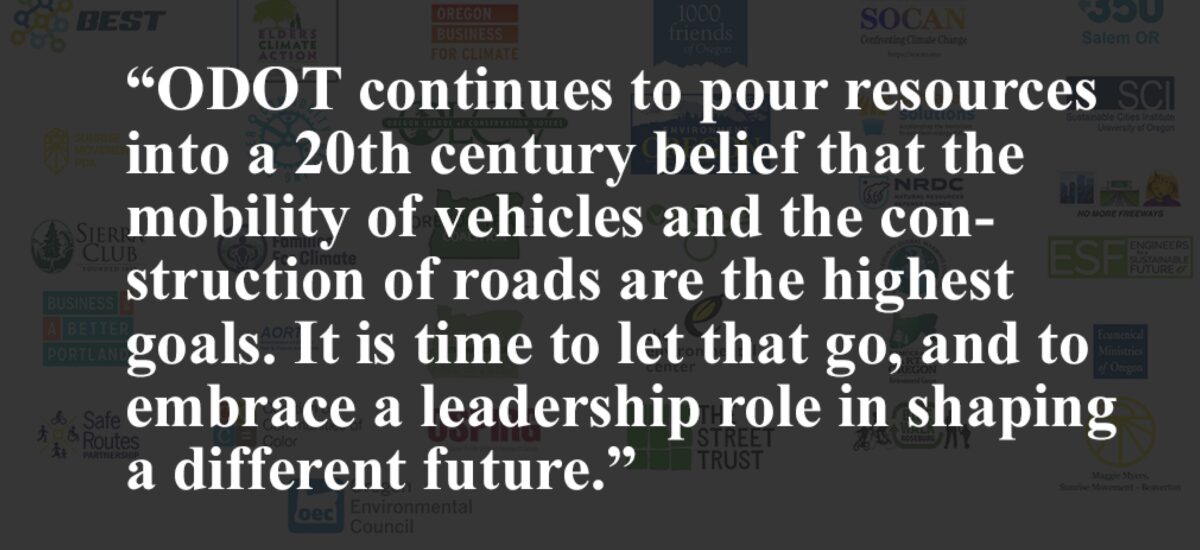
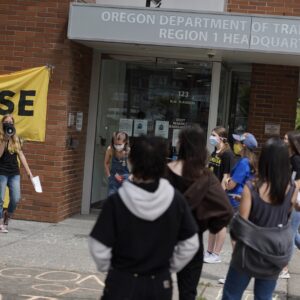
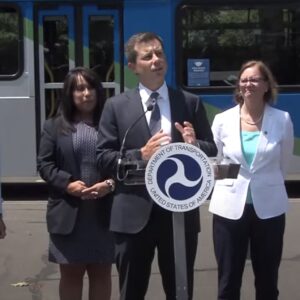
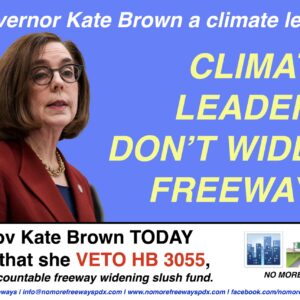
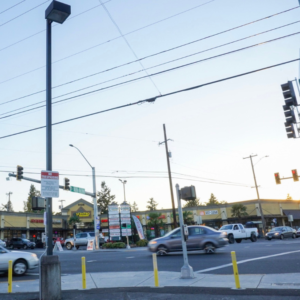
Thanks for reading.
BikePortland has served this community with independent community journalism since 2005. We rely on subscriptions from readers like you to survive. Your financial support is vital in keeping this valuable resource alive and well.
Please subscribe today to strengthen and expand our work.
The three most important words anyone reading this must comprehend: “it is past time”.
That is a literal statement. It will soon be too hot to grow crops where we grow them. The climate of the 2030s will not produce enough food to feed us all. Collapse is coming. Sooner than all the models showed.
https://gizmodo.com/satellite-images-reveal-the-shocking-toll-the-heat-wave-1847300445
https://www.vice.com/en/article/z3xw3x/new-research-vindicates-1972-mit-prediction-that-society-will-collapse-soon
Someone should tell the truth.
And just today, some members of my state’s Congressional delegation (Angie Craig and Amy Klobuchar) are calling for an extension of corn-ethanol subsidies. As a reminder, making ethanol from corn is so staggeringly inefficient that it uses more fossil fuels and generates more carbon than are saved by substituting it for gasoline. And it already uses 40% of the national corn crop: that’s right, millions and millions of acres that could be growing food are instead very inefficiently (and very carbon-intensively) filling up our tanks. It’s only one of about a hundred things we need to do right now to stop spewing carbon into the atmosphere, but we need to put a stop to this program. We’ll need that acreage for food real soon.
If polar-vortex heat-dome oscillations develop and grow in intensity in coming years, conditions exceeding wet bulb >95F are not out of the question. This is the point at which fans fail to prevent your body temperature from running away. Currently there is an unprecedented mass installation of air conditioners happening in the NW. I’m predicting that the power suppliers won’t be prepared for the demand spike of millions of new units being switched on at the same time during a future heat dome, resulting in wide spread power outages. When a wet bulb >95F condition coincides with a power outage, those lucky enough to survive will wake up to see the streets lined with dead bodies who didn’t make it to the packed cooling centers, because it was too hot for the bus drivers to work, and too hot for the PGE workers to get the power turned back on.
When this happens, ODOT will have blank vacant stares, switched off microphones, and calls for road widenings so that people can drive to cooling centers faster. Idling cars with air conditioners running will be touted as a necessity for people to survive the power outages, until the gas tank runs out at least (too hot for the gas station workers to show up).
https://advances.sciencemag.org/content/6/19/eaaw1838
We would save a lot more power and decrease the need for a/c and heat by making it mandatory to insulate homes and businesses in warmer places in the SE, SW, & Pacific NW, like they already do in the cold parts of the country. The newer a/c units are far more energy efficient than the old ones and often run on 110 plugs rather than 220, particularly if they are using heat exchanges, but of course that only goes so far.
Now if only they could do something about those damn leaf blowers – maybe use rakes? And those mobile steel cages parked everywhere.
Out here in the SE we regularly have a dew point of over 70 degrees, sometimes over 80 degrees, from June through mid-September, so we often run the a/c even at night.
“conditions exceeding wet bulb >95F are not out of the question. This is the point at which fans fail to prevent your body temperature from running away.”
That explains why places like India and Arizona are so sparsely populated – it’s too hot for humans to survive there.
Arizona and India have almost never reached wet bulb >95F / 35C temps – that is the temperature of a thermometer when the sensor bulb is covered in a water-saturated cloth. To reach it you need 130F / 54C dry heat, or 110F / 43C with 50% humidity – such conditions are very rare, usually only lasting a couple of hours. In most places if you get that much heat and humidity you get thunderstorms (even in Arizona, especially in India) and that cools it off quickly. Oregon has never gotten close. The highest every daily max wet bulb temp in Oregon was 27C (81F) in Benton County. Phoenix AZ has reached 30C, Death Valley 31C (all these are wet bulb temps). Interactive map: https://news.climate.columbia.edu/wp-content/themes/sotp-foundation/dataviz/heat-humidity-map/
in AZ humidity is too low for that fear vector to play out. never, ok 99% possibility, it never exceeds 60% in daylight heat.
Thank you Jonathan!
We’ve been in climate “crises mode” for over 50 years. We did nothing in the 1850 during the period of smoky dark satanic mills of Charles Dickens; we did nothing in the 1950s during the post-war boom; and likely we will continue to do nothing through the 2050s during the robot boom. We’ve gotten so partisan that even our responses to health, wellness, and pandemics has now been politicized, not just in the USA, but even in Europe and throughout the world.
And of course insane dictators and terrorist organizations continue to build nuclear bombs, to add to the vast and very unsecured stockpiles in the “enlightened” industrial countries.
I’d say we are screwed.
Which is why I don’t blame ODOT, or my own NCDOT, or the USDOT – they are simply reflecting a nihilist reality in our general population and politics – we are fucked, fix what you can, try to have a life, keep cool and breathe while you can, and move on.
I can’t argue with “nihilist” but in the case of ODOT I would suggest adding ‘reactionary’. Their systematic slaughter of viable trees under the guise of maintaining road safety was the worst of Old Oregon.
Let ‘er rip, David. I figure I’ve got about 23 more years on the planet, cross my fingers another decade of decent enough health, maybe less . . . at some point one has to be happy and just appreciate living a few more years, while fixing “what you can.”
Hold on! Anything done to mitigate climate change will impact jobs and hammer the stock market. Plus, maybe a tax on wealth to help pay for it. We already know where this is headed.
Anything done to mitigate climate change will create jobs and show the basic irrelevance of the stock market, and the rich people currently getting a free ride should help foot the bill.
There, fixed it for you!
10 or 15 years ago the Economist – not the world’s most progressive publication – had a cover story about the coming climate crisis. They analyzed a number of likely and possible future climate scenarios, compared with the costs of mitigating them by reducing carbon emissions.
Their conclusion was that even under relatively conservative impact scenarios, even highly aggressive carbon reductions were far less costly to society as a whole than doing nothing.
And here we are in 2021. Just as the Tobacco Institute did with tobacco and the National Sugar Institute did more recently with refined carbohydrates, the American Petroleum Institute has been carrying out a far-reaching campaign, successfully convincing a large segment of our population that fossil fuels aren’t harmful, successfully lobbying Congressional members to do nothing and funding fake science to contradict their own internally conducted science. Like these other industries, they have privately known for decades (in the case of some oil companies since the <em1950s, and most have known since the 1970s) the harm their product causes while publicly denying it.
My state (Minnesota) is suing the API, ExxonMobil and Koch Industries for fraud, deceptive practices and false advertising. A couple other states (as well as a number of cities and counties) have filed similar suits, but to my knowledge Oregon is not among them. AG Rosenbaum most do something in that office (heaven knows she isn’t revisiting Oregon’s history of non-unanimous jury convictions, recently ruled unconstitutional by SCOTUS, even though many subjects are still incarcerated) … maybe try to convince her to join the fight? This is how we put their feet to the fire, and we can’t get public support for the changes we need to do until we shut down the disinformation machine.
There is a call for “immediate action” but the demands focus on preventing new emissions, not on permanently eliminating existing emissions.
Pausing, pricing, right-sizing do not reflect the urgency of ongoing ecocide, according to my opinion.
Check. The status quo is destroying the environment (including our ability to produce staple crops) perfectly well. No need to add freeway lanes, the places that we call ‘breadbaskets’ will be crispy soon enough.
In the meantime, let’s all spend our time discussing how we are going to re-arrange the deck chairs. Let’s start every sentence of every article, post, and comment, with, “If only we start doing X, this thing can be managed…” Let’s keep pretending. While time keeps on slippin into the future.
https://www.youtube.com/watch?v=6zT4Y-QNdto
If anyone cares to take a look at the ODOT budget (I’ve provided links in the past), one will see that constructing roads is not the highest priority. The majority of funds go toward operations and maintenance. I suppose if one is going to be fully anti-fossil fuel, we might as well stop maintaining roads as well as stop constructing them.
Obscure local meetings where officials rubber stamp freeway expansions is exactly where the focus should be. This is where these projects can be stopped and real change can happen. It’s not about some distant corporate pipeline, it’s about local officials in empty meetings making decisions right here right now on how to incinerate all that oil in yet more crazy freeway projects.
Yes local elected officials have power. When it comes to ODOT intransigence I tend to look somewhere else. The members of the Oregon “Transportation” Commission serve at the pleasure of the governor. The governor can fire them.
The freeway building buck stops with Kate Brown.
Well said. And, — remind me, Kate Brown is a Republican? Or Democrat? Oh, that’s right! The entire state is run by Oregon Democrats. They control the Legislature and the Executive. And the Judiciary! These are people who tax bikes, expand freeways, and throw out suits challenging the government’s inaction. When it comes to climate change, Oregon Democrats are just another status quo party.
If you want to address climate change in Oregon, it won’t be by voting for Democrats!
Right on Adah Crandall! The audacity of whomever cut her off shows we need better participation and action in government.
Cutting off a microphone is a confession that while you may have power, your ideas have failed.